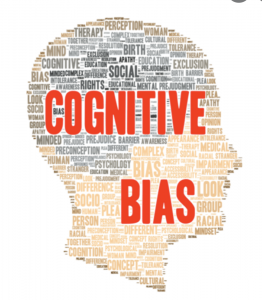People are known to distort reality and show bias in their judgments in systematic ways. Leaders themselves are all-too human in demonstrating these cognitive biases. Steven J. Stroessner and Brett N. Hu at Barnard College have recently written about these biases in The SAGE Encyclopedia of Leadership Studies, co-edited by George R. Goethals, Scott T. Allison, and Georgia J. Sorenson, which will be published in 2023.
According to Stroessner and Hu, there are three classes of cognitive biases that leadership must be especially careful in navigating. These biases are: (1) conservative biases; (2) information processing biases; and (3) egocentric biases.
1. Conservative Biases
Write Stroessner and Hu: “People tend to be excessively conservative regarding information processing, regularly forming premature conclusions, holding them too firmly given new information, and defending them even when they are no longer tenable given changing conditions. Therefore, leaders regularly demonstrate a status quo bias, a preference to maintain current states.”
One tragic example is when political leaders justify the continuation of a war based on the number of lives already lost rather than on the prospects for a successful outcome. In the early 1970s, the US remained in the Vietnam conflict despite knowing that the war was unwinnable. Leaders’ excuse at the time was that “honor” needed to preserved.
Leaders also show a confirmatory bias, looking for information that confirms their opinions while simultaneously ignoring contradictory information. Confirmatory bias at a group level can lead to groupthink, a diseased form of group decision making in which group members suppress arguments that challenge a leader’s expressed preference.
2. Information Processing Biases
Leaders must gather information to make decisions, and at times leaders are over-reliant on simple rules of thumb called heuristics. The availability heuristic involves the ease with which information can be accessed from memory. For example, people tend to erroneously judge that dying from a tornado is more common than dying from stomach cancer. More people die from the latter but media coverage focuses on the former.
The representativeness heuristic refers to an over-reliance on the similarity of an event to a typical instance of that event. For example,  people erroneously believe that six coin-tosses heads-tails-tails-heads-tails-heads are more “random” than six tosses of heads-heads-heads-tails-tails-tails.
people erroneously believe that six coin-tosses heads-tails-tails-heads-tails-heads are more “random” than six tosses of heads-heads-heads-tails-tails-tails.
A leader’s judgments can also be biased by how a problem is framed. Psychologists have found that the pain associated with loss is greater than the pleasure associated with gain. Thus, a decision problem framed as a loss will lead to different judgments — often a more conservative judgment — than the same problem framed as a gain.
3. Egocentric Biases
The egocentric bias refers the tendency to view oneself or one’s group as superior to others.
The false consensus bias leads people to think that their own preferences and views are widely shared. When this bias is challenged by people expressing opposing views, they tend to be criticized or dismissed.
The self-serving bias refers to the tendency of people to view themselves in a favorable light, exaggerating positive attributes and minimizing negative ones. For example, people view themselves as more moral and competent than others. This bias explains the all too common tendency of leaders to take responsibility for successes but avoid blame for failures.
Ingroup biases involve the belief that one’s own group is better than other groups. While ingroup bias can facilitate ingroup cohesion and self-esteem within the group, it leads to prejudice and discrimination directed toward outgroup members.
The more leaders are made aware of these biases, the better their decision making can be. Awareness does not always eliminate cognitive biases, but they can reduce them. Here is the reference/citation for the encyclopedia:
Goethals, G. R., Allison, S. T., & Sorenson, G. J. (Eds.) (2023). The SAGE Encyclopedia of Leadership Studies. Sage: Thousand Oaks, CA.
– – – – – – – – – – – – – – – – –

I wonder how many people will read this and say, “Yup, that’s exactly how my enemies are.” 😀
And how many people will strictly associate the word conservative with the Right Wing.